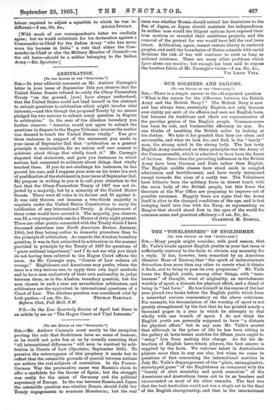SIR, —Mr. Andrew Carnegie must surely be the exception proving the
rule that Scotchmen have no sense of humour, or he would not poke fun at us by roundly asserting that "all international differences" will soon he resolved by arbi- tration in Courts of Law (Spectator, September 16th). To perceive the extravagance of this prophecy it needs but to reflect that the ostensible grounds of quarrel between nations are seldom the real subjects of contention. In the Franco- German War the provocative cause was Russia's claim to offer a candidate for the throne of Spain ; but the struggle was✓ really for the union of Germany and the political supremacy of Europe. In the war between Russia and Japan the ostensible question was whether Russia should fulfil her Treaty, engagements to evacuate Manchuria; but the real
issue was whether Russia should extend her dominions to the Sea of Japan, or Japan should maintain her independence. In neither case would the litigant nations have exposed their true motives or revealed their ambitions projects, and the removal of the pretext for war would have left the real issue intact. Arbitration, again, cannot restore liberty to enslaved peoples, and until the boundaries of States coincide with racial divisions the risk of war will continue to exist as long as national existence. There are many other problems which fprce alone can resolve ; but enough has been said to expose the baseless fabric of Mr. Carnegie's vision.—I am, Sir, &c., Via LEGIS VITA.










































 Previous page
Previous page